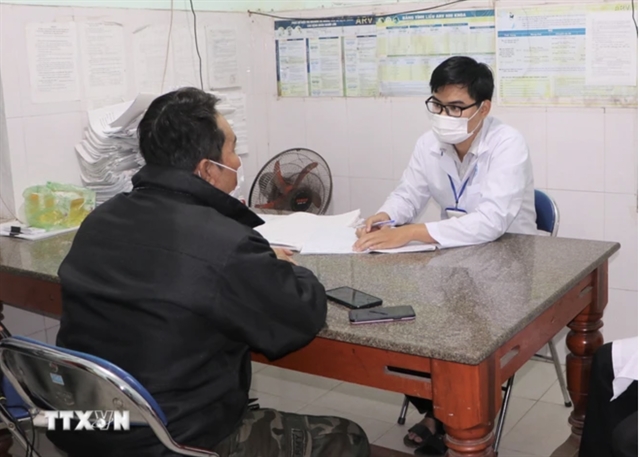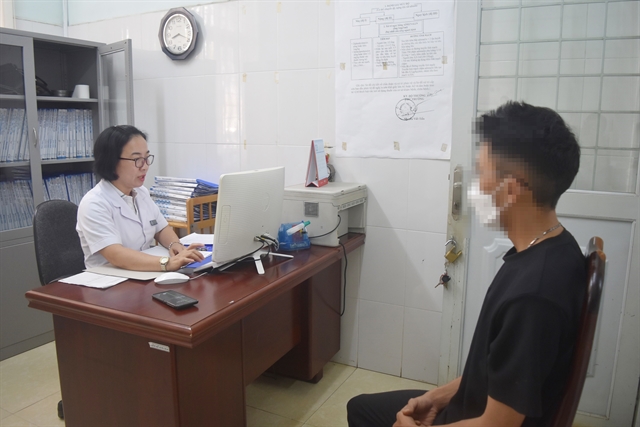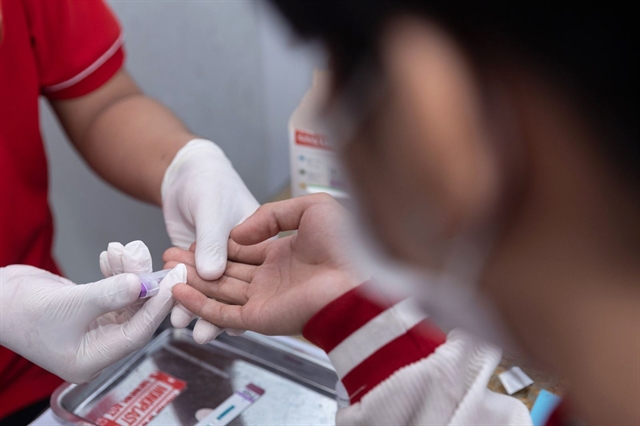 Society
Society

 |
| A man living with HIV receives advice on taking antiviral drugs by doctors from the Đắk Lắk Province Centre for Disease Control. VNA/VNS Photo Nguyên Dung |
Khánh Dương
HÀ NỘI — The increasing use of stimulant drugs among men who have sex with men (MSM) may be contributing to more new HIV infections within this population, which accounts for the biggest share of new HIV infections in Việt Nam, healthcare experts have warned.
While the public health sector finds it hard to access MSM engaging in sexualised drug use (usually referred to as chemsex), community-based organisations have demonstrated their role as extended arms of the public healthcare sector in providing care and counselling to limit chemsex and minimise HIV infection.
Dr Nguyễn Thị Minh Tâm, head of the Prevention Department at the Việt Nam Administration of HIV/AIDS Control (VAAC) under the Ministry of Health, said the pattern of HIV infection in Việt Nam has shifted from transmission through blood in drug injections to sexual contact, especially among MSM and transgender women.
There are now 267,391 people living with HIV in Việt Nam, following the discovery of the first case of HIV infection in HCM City in 1990.
According to national HIV sentinel surveillance data, HIV prevalence among MSM has grown rapidly, from 7.4 per cent in 2016 to 12.5 per cent in 2022.
MSM are expected to be the primary risk group for Việt Nam’s HIV epidemic. Over 40 per cent of total new HIV infections every year in Việt Nam are among MSM.
Tâm said: "In Việt Nam, drug use and HIV infection are linked together. This is such a concerning issue that stimulant drug use among MSM has significantly impacted the country's efforts to prevent and control HIV/AIDS.”
 |
| A rapid HIV testing service provided by a social enterprise in Việt Nam for people at risk of HIV infection. Photo baotintuc.vn |
In 2020, Lighthouse Social Enterprise conducted research on sexual risks among Việt Nam’s MSM using amphetamine-type stimulants in sexual contexts. It interviewed 269 Vietnamese MSM aged 18 or older, and found that the participants started engaging in chemsex at a median age of 20 years old.
A majority of interview participants -- 71 per cent -- do not always use condoms and lubricants in chemsex sessions, and 5 per cent never use these protective measures.
These figures are alarming, since just 11 per cent of study participants knew the HIV/sexually transmitted infection status of all of their sexual partners in chemsex sessions. Meanwhile, 34 per cent knew the status of a few of their partners, and 31 per cent did not know anything.
Associate Professor Đỗ Văn Dũng, director of the HIV-Addiction Technology Transfer Centre under the HCM City University of Medicine and Pharmacy, said stimulant drug use appeared to raise the risk of HIV infection. Groups that participate in chemsex were even more susceptible to HIV transmission, he said.
“Chemsex encourages having sex with multiple partners without taking precautions. Many MSM share needles, forget to use condoms and forget to take other HIV preventive measures like pre-exposure prophylaxis (PreP),” he noted.
In addition to the risk of HIV infection, chemsex poses a mental health risk, including a risk of anxiety disorders, loss of appetite, stress and depression, as well as the risk of toxicity and overdose due to drug use, with some drug users experiencing mental disorders and even death, according to Dũng.
Arms wide open
The Lighthouse’s research pointed out that MSM who engage in chemsex are more anxious when accessing harm reduction services.
More than 90 per cent of those who engage in chemsex worry about being judged or poorly treated by healthcare providers, including fears of the providers disclosing their information. As a vulnerable group, they seem to believe in their community more than health providers or experts, according to the report.
Community-based organisations are actually considered the most trustworthy by MSM. They have shown themselves to be a powerful force in promoting both sexual and mental wellness.
Bảo Ân, director of the Centre for Applied Research on Men and Community Health, said MSM’s readiness for psychological counselling was the most important factor.
For customers using PrEP who face psychological problems, organisations could remind them about medication adherence and safety measures until they are more ready for psychological counselling, he said.
“The root reason for stimulant drug use may begin as a coping solution for stress or loneliness, or it may be influenced by social stigma at work, school or other environments. These men may have trouble ‘coming out’. Some people experience psychological pain as a result of disclosing their sexual orientation and turn to drugs as a different kind of coping,” he told Việt Nam News.
Managing stimulant drug use, reducing frequency or stopping drug use requires time and resources to address these underlying causes. It cannot be done in a short time and requires a certain amount of financial resources for treatment both physically and psychologically, according to Ân.
Nguyễn Minh Trang, programme manager of Harm Reduction and Addiction Treatment under the non-profit organisation Supporting Community Development Initiatives (SCDI), said her organisation had chosen a peer-led approach that is essential for building trust among chemsex’s hard-to-reach populations.
“We work with young people who use methamphetamine (meth). We realised that the young people who use meth require different things from people injecting heroin,” she said.
"They don’t go to meth clinics. They don’t go to needle exchange programmes. They need counselling and mental health support. They need to be listened to about their adverse childhood experiences, the reasons why they started using drugs to begin with, and their relationships with people in their life," she noted.
The SCDI has designed an intervention package provided by the community for MSM engaging in chemsex. The package includes pre-session, during-session and post-session support.
Trang said: “Mental health support is extremely important to people engaging in chemsex. That support can only be delivered by the community itself, and not health experts, because people are not open to sharing their experiences with anyone they don’t trust.”
Challenges persist
Trang said persistent social stigma around chemsex limited community-based organisations’ outreach to MSM engaging in the practice.
“Talking about sex is taboo in our culture. It’s hard for people in our community to talk about drug use, because it is still prohibited in Việt Nam and many countries in Asia,” she said.
Other challenges came from connecting to harm reduction services. Mental, physical and sexual health services should be friendly enough for people to reach and available for the community to access, she said.
Representatives from community-based organisations also suggested that Việt Nam needed to create a supportive environment for accessing harm reduction services. — VNS